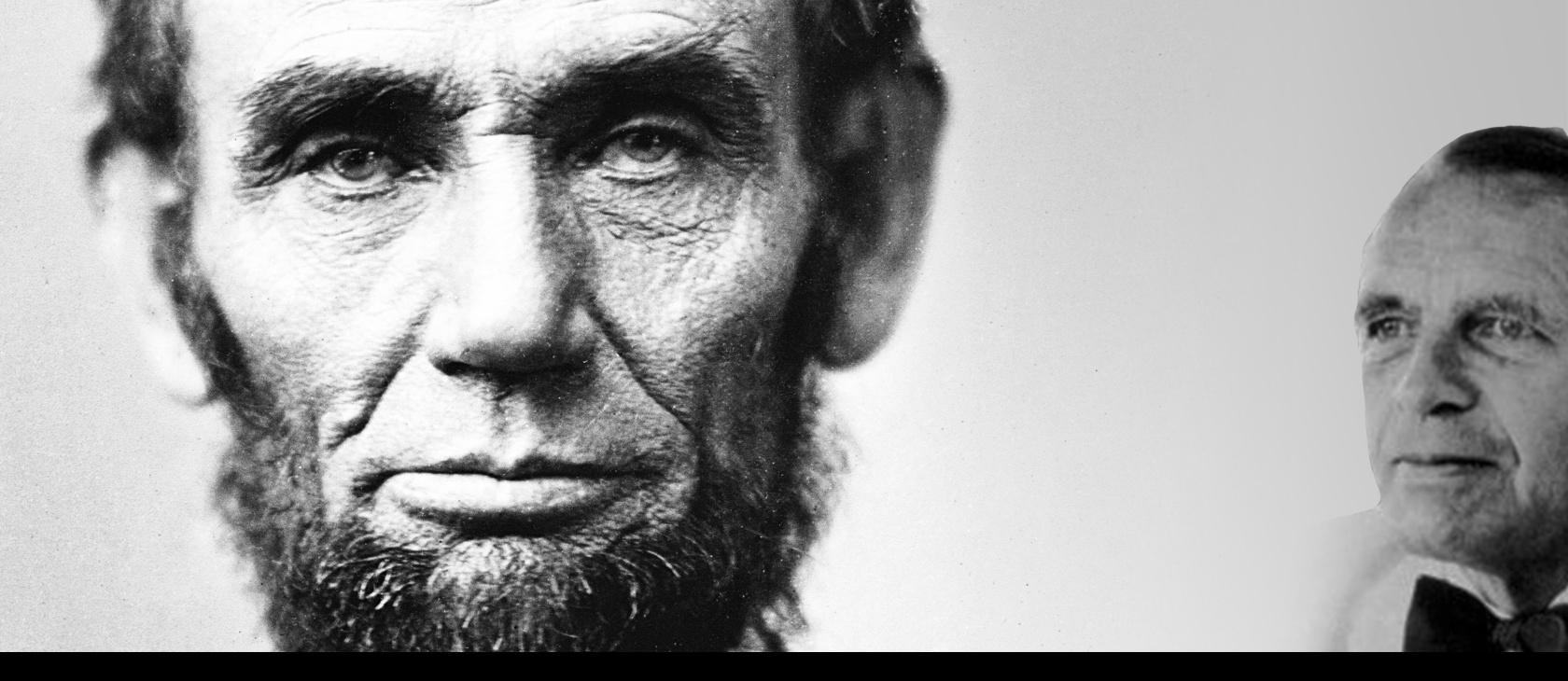What image is more quintessentially American than the pioneer courageously moving across the Great Plains in a covered wagon with his family and livestock in tow? In many ways, the hundreds of thousands of families who blazed a trail into the West made up a sort of “marching republic.” Their movement represented everything that made the United States the greatest republic in human history: tenacity, grit, and a willingness to challenge the status quo.
Initially, it would seem that Lincoln and Röpke didn’t have much in common. But upon closer examination, it becomes clear how each man saw the entrepreneurial spirit as key to both virtue and freedom.
Much of this expansion was made possible by the Homesteading Act of 1862, passed by a Republican Congress and signed into law by President Abraham Lincoln. The law provided settlers with 160 acres of land for a nominal fee. It was perhaps the largest act of privatization in American history. Although it may not seem obvious at first, this economic legacy stands as one of the strongest testaments to President Lincoln’s commitment to republican liberty.
In fact, entrepreneurship has been one of the forces throughout history that has best vindicated political orders centered on the human person and his God-given rights. Both patriot-statesmen, such as Abraham Lincoln, and Christian humanists, such as Wilhelm Röpke, have seen the relationship between entrepreneurship and the human person’s natural freedom, and used that connection to lead their societies into periods of untold prosperity and happiness.
Christian Humanism After WW I
In the 20th century, Christians in the West formulated a new humanism to address the crises and horrors confronting them. Ideology, be it Soviet communism or German Nazism, begins with a rejection of universal human dignity; ideologues see men as the mere means to the creation of utopias. The Christian humanists believed that these totalitarians had it backward when they put their repulsive ideologies before man. Instead, they believed that the human person must be at the center of all social thought.
Wilhelm Röpke exemplified this disposition when he wrote in his final book, A Humane Economy: “My picture of man is fashioned by the spiritual heritage of classical and Christian tradition. I see in man the likeness of God; I am profoundly convinced that it is an appalling sin to reduce man to a means … and that each man’s soul is something unique, irreplaceable, priceless, in comparison with which all other things are as naught.” For Christian humanists like Röpke, that God created man in His image was a matter of doctrine. All human action must be interpreted in light of that most fundamental truth, and Röpke’s contribution was to show that even seemingly mundane commercial life must be interpreted this way.
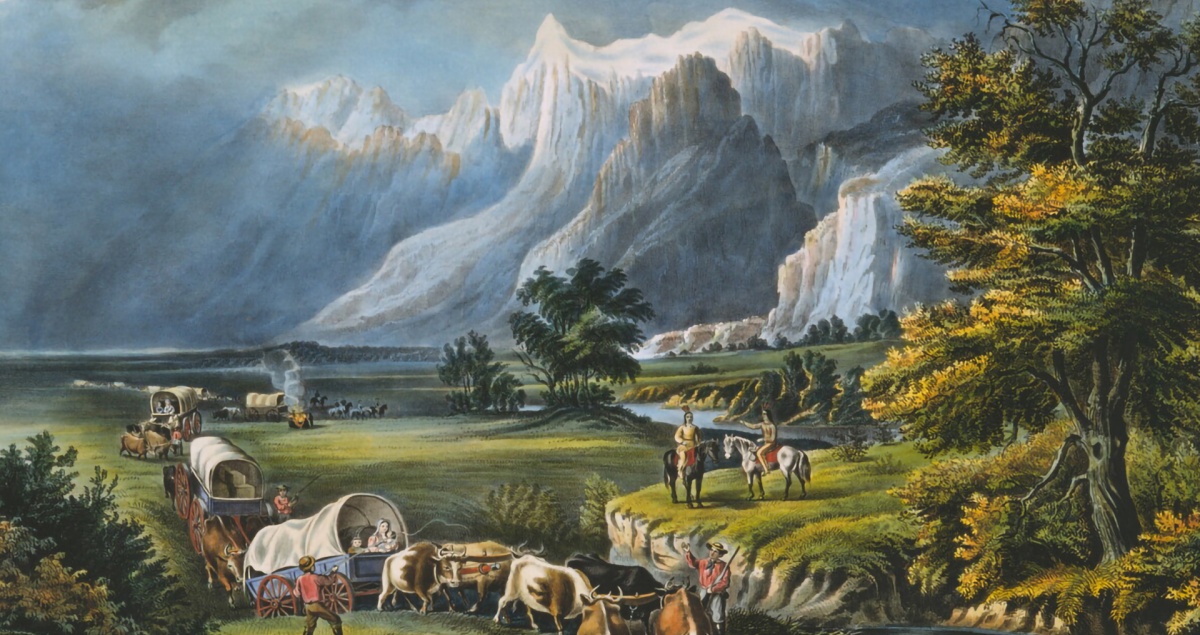
Röpke, of all people, was eminently qualified to articulate the importance of a doctrine like the imago Dei. Born in a small German village to a family of Lutheran ministers and doctors in 1899, Röpke was just old enough to serve his native land at the end of the First World War, winning the Iron Cross for valor on the battlefield. Many of the 20th century’s finest Christian humanists—C.S. Lewis and J.R.R. Tolkien, to name just two—fought on the Western Front and witnessed firsthand the horrors wrought by the clash of nations.
The trauma of the trenches left them eternally wary of the ideologies, such as nationalism, that led to the war. Although he was on the opposite side of the front, Röpke experienced the same awful awakening as the aforementioned Christian humanists. In his 1959 essay “The Economic Necessity of Freedom,” he wrote, “Life in the army had shown what it meant for the individual to exist as part of an apparatus whose every function assumed lack of freedom and unconditional obedience.” The young economist-in-training saw the way that illiberal nationalism led to the outbreak of war and how militarism dehumanized millions on the front, so he dedicated himself to a scholarship of freedom to ensure that no other ideology could cause such chaos and tyranny again.
Röpke’s Humanist Economics
For Röpke, this meant that his task as an economist was to remind society that a proper respect for the human person entailed a vigorous defense of free enterprise. Command economies, in his view, crush the human person under the weight of centralization; indeed, Röpke explained in A Humane Economy that free enterprise “is the only economic order compatible with human freedom, with a state and society which safeguard freedom, and with the rule of law,” because “these are the fundamental conditions without which a life possessing meaning and dignity is impossible for men of our religious and philosophical convictions and traditions.” Röpke pointed out that the two predominant ideologies of the 20th century, communism and fascism, based their appeals to the people on claims that their respective brands of socialism could manage the economy more effectively than historic capitalism.
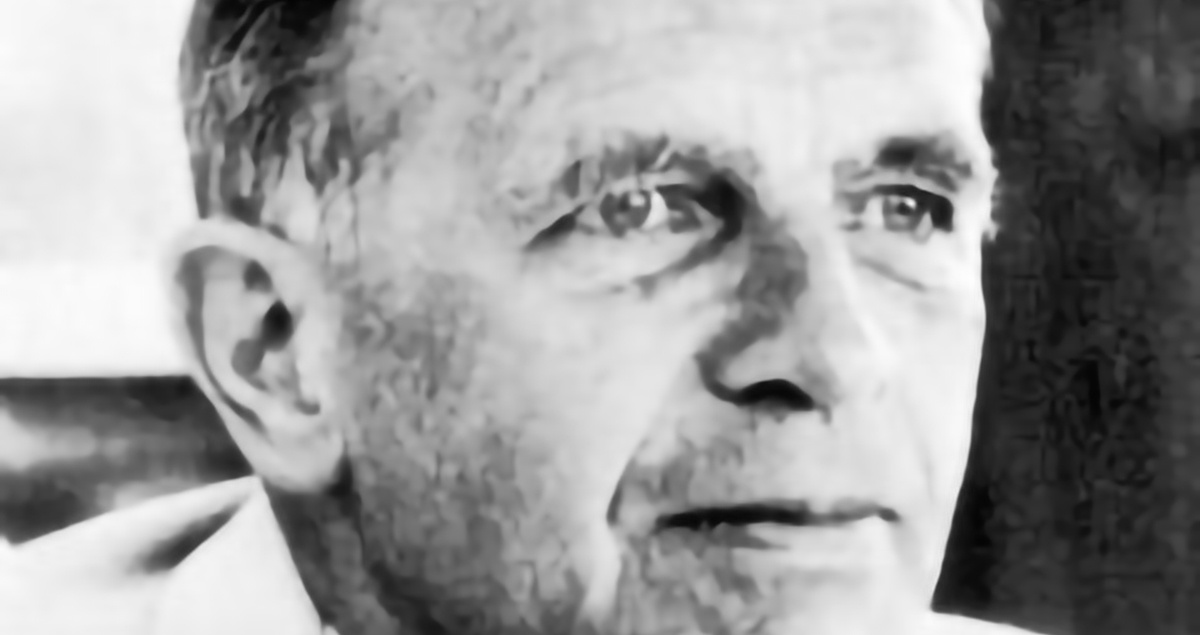
As Röpke defended this position through the early 1930s and became a leader of the anti-fascist resistance, other German intellectuals, such as Martin Heidegger and Carl Schmitt, proudly joined the Nazi Party and mounted spirited defenses of Adolf Hitler’s totalitarianism. Just two weeks after Hitler’s ascension to the German chancellorship, on February 8, 1933, Röpke’s rebellion against the pro-Nazi zeitgeist culminated with a public speech in Frankfurt condemning Nazism’s socialist economics. Shortly thereafter, Gestapo agents arrived at Röpke’s home to threaten him into silence; Röpke and his family fled first to Turkey and then to Switzerland, becoming the first of over 400,000 intellectual refugees to escape the clutches of Hitler’s secret police.
After the Allied victory in the Second World War, Germany lay prostrate. Roughly a third of Röpke’s homeland suffered communist totalitarianism behind a cruel iron curtain; the major cities of the once-great nation were in ruins; and revelations about the people’s complicity with the Holocaust left the moral life of the country in ruins, too. Socialists and other left-wing factions in West German politics laid the blame for the crisis at the feet of what many called “historic capitalism.” They argued that market economics, driven by the profit motive, was socially corrosive and resulted in the kind of moral corruption that paved the way for fascism—as exemplified by the failings and eventual collapse of the Weimar Republic.

Röpke and other economists in the German-speaking world actually appreciated elements of this moralistic critique of capitalism because, as Röpke wrote in A Humane Economy, it showed that “the market economy is not everything. It must find its place in a higher order of things which is not ruled by supply and demand, free prices, and competition.” These economists who embraced liberal economics and a Christian humanist anthropology knew that neither laissez-faire capitalism nor so-called democratic socialism could restore the German people, either materially or morally. Röpke wrote in 1959: “I sided with the socialists in their rejection of capitalism and with the adherents of capitalism in their rejection of socialism. … The third way I have pursued … has come with good reason to be called ‘economic humanism.’” Armed with this innovative argument for an economics rooted in a traditionalist anthropology, Röpke’s followers in West Germany began constructing concrete policies to restore Europe.
Erhard devoted himself to expanding free enterprise in West Germany without ending government-run systems of welfare.
Ludwig Erhard, the West German minister for economic affairs between 1949 and 1963 statesmen who in designing and implementing this new, third way, sometimes called the “social market.” Like Röpke, he grew up in the German countryside and became an early opponent of Nazi ideology, particularly socialism’s command economics. According to historian Alfred C. Mierzejewski, “Erhard experienced Röpke’s works as an emotional reinforcement to his own free market values,” especially in terms of policies related to the promotion of free trade, a stable currency, and an end to government-favored cartels.
Vitally important to this vision for economic recovery was an end to price and rent controls, which unfairly restrained growth and entrepreneurship. In this way, Erhard devoted himself to expanding free enterprise in West Germany without ending government-run systems of welfare such as social security, and Röpke defended and encouraged him at every turn from his academic post in Switzerland. Although it encountered challenges along the way, this third way between ideological extremes contributed to what Germans today call the Wirtschaftswunder, an economic miracle. In his own work, Röpke declared that the swift recovery of the West German economy “was a unique and instructive example of … how quickly and thoroughly [a nation] can recover from its fall and start on a steep, upward climb if only economic policy recognizes its error and reverses its course.”
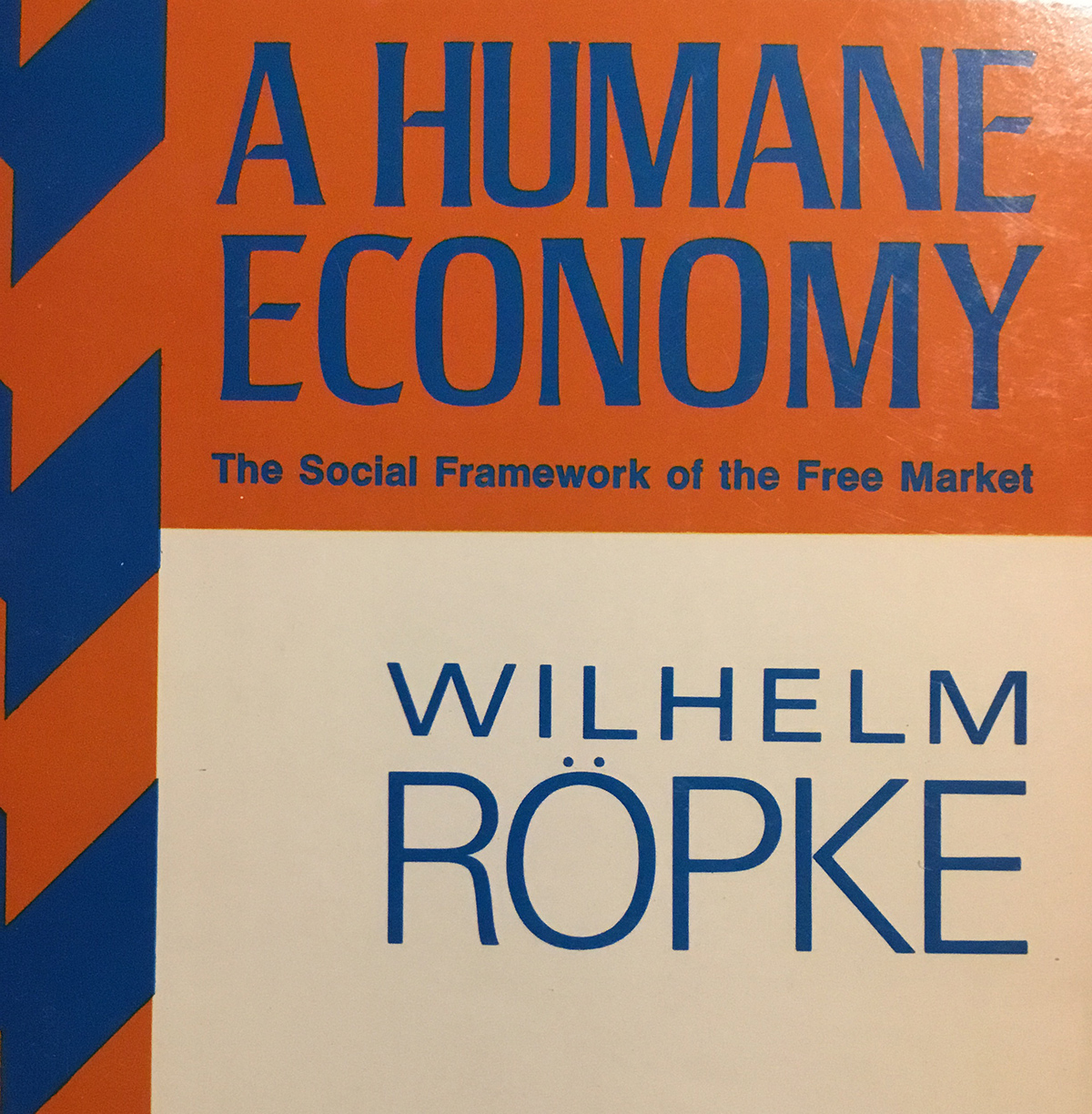
Economics and the Good Society
For Röpke, though, this victory was more than economic—it was moral. John Maynard Keynes famously declared that “in the long run, we’re all dead,” and encouraged his readers to formulate economic policy around short-term incentives. Röpke saw no virtue in such a path; instead, he believed that economic policy should be ordered toward what are often called “bourgeois virtues,” such as saving money and planning for the future.
If the aim of the good society, as ancients such as Plato and Aristotle taught, is to set its citizens on the path to virtue, then Röpke’s contention was that a market economy could teach people the virtues of responsibility and service. Socialist systems were always preoccupied with the present; bourgeois society, however, was ordered around a healthy respect for the heritage of the past and a concern for passing that heritage on to the future. Röpke wrote that the advocates of bourgeois market economics “have learned to regard the individual, with his family, relying on his own efforts and making his own way, as a course of vital impulses, as a life-giving creative force without which our modern world and our whole civilization are unthinkable.”
Röpke’s support for free enterprise stemmed from this central principle of man as imago Dei.
Röpke, then, organized his ideas about bourgeois economic life and the virtues it entails around the centrality of the human person through the concept of entrepreneurship. In A Humane Economy, Röpke compared the entrepreneur to a ship’s captain, navigating “the sea of human nature” spurred on by competition and the profit motive. Channeling the thought of Austrian economists such as Israel Kirzner, Röpke here suggested that, ultimately, the entrepreneur is serving other men.
Indeed, Röpke argued that the entrepreneur looked to serve other men even in his pursuit of the profit motive. As he put it once in an essay, “The great error of socialism is its steadfast denial that man’s desire to advance himself and his family, and to earn and retain what will provide his family’s wellbeing far beyond the span of his own life, is as much in the natural order as the desire to be identified with the community and serve its further ends.” A humanist society is a civilization of love, ordered toward the common good of all men. If what Röpke wrote about free enterprise is true, what better way is there to build such a civilization than to unchain the entrepreneur and enable him to serve the human person?

Abraham Lincoln’s Economics of Equality
When we consider Abraham Lincoln alongside the verb unchain, we probably imagine the Great Emancipator doing something quite different than the economic reforms made by Erhard and Röpke in postwar West Germany. After all, if these German economic humanists are associated with peacefully rolling back government’s authority in the privatesector, then is not Lincoln famous for maintaining the authority of the government through one of the bloodiest wars in U.S. history? It may therefore seem paradoxical to link Wilhelm Röpke and Abraham Lincoln. But Röpke’s economic humanism and Lincoln’s ideas about republican society share a traditional vision of the human person and have much else in common.
For Lincoln, the central fact of the American regime is what he called at Gettysburg “the proposition that all men are created equal.” In his view, the republic’s Founders shaped everything about this country’s form of government and the citizens’ way of life around that central, self-evident truth. Take, for instance, what Lincoln said about the Declaration in an 1858 campaign speech in Chicago, Illinois. Pointing out the waves of immigrants that arrived on American shores since the founding, Lincoln argued that all these men were heirs of the American Revolution just as much as those descended by blood from the Founders, because:
When they look through that old Declaration of Independence they find that those men say that “We hold these truths to be self-evident, that all men are created equal,”and then they feel that that moral sentiment taught in their day evidences their relation to those men, that it is the father of all moral principle in them, and that they have a right to claim it as though they were blood of the blood, and flesh of the flesh of the men who wrote that Declaration, and so they are.
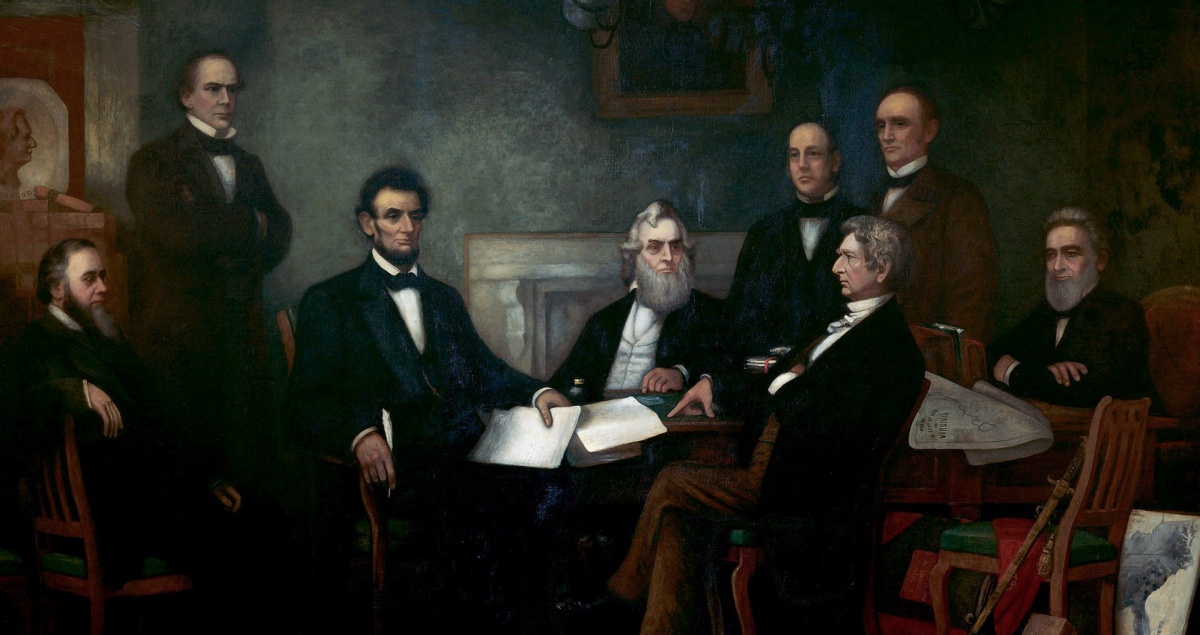
For Lincoln, the most important truth of all political life is the moral principle that all men are created equal and therefore endowed by their Creator with certain natural, inalienable rights. Lincoln argued in the same speech that this is why his opponent for Illinois’ U.S. Senate seat, Stephen A. Douglas, was wrong to say that the various states should decide whether to permit chattel slavery within their borders. This so-called popular sovereignty was a chimerical argument, according to Lincoln; if it can be said that the man stolen from Africa into slavery is not of equal dignity to the republican citizen of a state like Illinois, then what is the foundation for American freedom? Lincoln asked his audience at Chicago, “If one man says [the Declaration] does not mean the negro, why not another say it does not mean some other man? If that Declaration is not the truth, let us get the statute book in which we find it and tear it out.”
In the epilogue to his book International Economic Disintegration, Röpke wrote something quite similar to Lincoln’s statement at Chicago, namely that “the antithesis of tyranny is not democracy—a word that only indicates where power is vested—but the liberal principle which, now as always, imposes on every government, however it is constituted, the limits required by tolerance and respect for the inalienable rights of the individual.” While Röpke framed his humanistic politics around the historical Christian doctrine that all men are created in the image of God, Lincoln framed his anti-slavery politics around the historical American doctrine that all men are created equal.
Lincoln said, ‘We do wish to allow the humblest man an equal chance to get rich with anybody else.’
As has already been demonstrated, Röpke’s support for free enterprise stemmed from this central principle of man as imago Dei; how, then, did Lincoln’s notion of human equality influence the great statesman’s political economy?
In the first place, Lincoln was always careful to establish that, when he spoke of equality, he never meant this as an imperative to level society such that all men enjoy—or perhaps suffer—an equality of economic outcomes. In an 1860 campaign speech in New Haven, Connecticut, Lincoln said, “I don’t believe in a law to prevent a man from getting rich; it would do more harm than good. So while we do not propose any war upon capital, we do wish to allow the humblest man an equal chance to get rich with anybody else.” If all men are created equal, according to Lincoln, then no man deserves special privileges afforded to him at the expense of anyone else. Indeed, Lincoln continued:
When man starts poor, as most do in the race of life, free society is such that he can better his condition; he knows that there is no fixed condition of labor for his own life. … I want every man to have the chance—and I believe a black man is entitled to it—in which he can better his condition; when he can look forward and hope to be a hired laborer this year and the next, work for himself afterward, and finally to hire men to work for him!
This is Lincoln’s American dream, one rooted in the notion of self-improvement and free labor.
In an earlier speech at Cincinnati, Ohio, Lincoln directly contrasted this system of free labor with the system of slave labor that Southern radicals defended. Lincoln said that these fire-eaters claimed that the black man was by nature inferior to the white man, and therefore his servile state was a consequence of his creation. The future president went on to reject such a position wholesale, and turned to an absurd analogy to prove his point:
I hold that if there is any one thing that can be proved to be the will of God by external nature around us, without reference to revelation, it is the proposition that whatever any one man earns with his hands and by the sweat of his brow, he shall enjoy in peace. … I hold if the Almighty had ever made a set of men that should do all of the eating and none of the work, He would have made them with mouths only and no hands, and if He had ever made another class that he had intended should do all the work and none of the eating, he would have made them without mouths and with all hands. But inasmuch as He has not chosen to make man in that way, if anything is to be proved, it is that those hands and mouths are to be cooperative through life and not to be interfered with. That they are to go forth and improve their condition, as I have been trying to illustrate, is the inherent right given to mankind directly by the Maker.
Lincoln became the great antagonist of slavery because he viewed it as a violation of two great moral principles: first, that all men are created equal, endowed by their Creator with certain inalienable rights; and second, that one of those inalienable rights, what the Founders called “the pursuit of happiness,” was the right to self-improvement, or what we might call the entrepreneurial spirit.

Equality, Dignity, and a World in Crisis
The issue of slavery boiled over into a crisis and then erupted into war. At Gettysburg, Lincoln famously defined the Civil War as a challenge to the American proposition that all men are created equal, “testing whether that nation or any nation so conceived and so dedicated, can long endure.” The American republic was exceptional, according to Lincoln, not in the sense that the crimes committed by its citizens could be excused by some notion of chauvinist superiority. Instead, Lincoln’s sense of American exceptionalism is something more like a burden to prove that human liberty can serve as a solid foundation for a virtuous society.
Wilhelm Röpke held that the Cold War was a similar moment in the course of human events. “Surely everyone must realize by now,” he wrote in A Humane Economy, “that the world war against Communism cannot be won with radio sets, refrigerators, and wide-screen films. It is not a contest for a better supply of goods. … The truth is that it is a profound, all-encompassing conflict of two ethical systems in the widest sense, a struggle for the very conditions of man’s spiritual and moral existence.”
Both Lincoln and Röpke believed that nothing short of the future of human liberty was at stake in their time, and that, to use one of Lincoln’s most famous phrases, we cannot escape history. We … will be remembered in spite of ourselves. No personal significance, or insignificance, can spare one or another of us. The fiery trial through which we pass will light us down, in honor or dishonor, to the latest generation.”
All the same, it must be admitted that neither Röpke nor Lincoln perfectly lived up to their principles. At the height of the Cold War, Röpke wrote in defense of South African Apartheid, and in the 1850s Lincoln occasionally indulged in racist rhetoric. But these unfortunate remarks should not undermine our confidence in the principles of human dignity they articulated. Rather, the searing pain these hypocrisies cause should remind us just how universal these principles are, and how much work still needs to be done on their behalf.
The Common Things
Lincoln and, to a lesser extent, Röpke provide models for how a statesman can guide and aid his people through this “fiery trial.” But what can the ordinary citizen do? How can free laborers vindicate liberty in the face of tyranny, be it slave power or socialism? Both Lincoln and Röpke might answer those questions by turning, once again, to the entrepreneur. One contemporary thinker in the free labor tradition of both Lincoln and Röpke, John McNerney, wrote in his book Wealth of Persons: Economics with a Human Face that “in order to recapture an understanding of the motivation of the entrepreneur, we can paraphrase Socrates by saying, ‘the art of the entrepreneur does not think about what is good for the art of entrepreneuring, but what is good for the body-economic,’ that is, the common good of all persons who are participants in the economic drama.”
The term republic comes from an old Latin phrase, res publica. Roughly translated to English, it means “the common things.” Republicanism, from the time of Cicero down through Abraham Lincoln to Wilhelm Röpke, and even into our own time, is that way of government which puts the common good of all above the private good of any single individual or faction. Lincoln and Röpke, in their systems of free labor and the social market, articulated a way in which the entrepreneur becomes the ultimate republican figure, the chief servant of the common good.
By harnessing the profit motive in the context of a traditionally virtuous society, free enterprise enables society to turn even the most commercial and seemingly self-interested human actions to the service of the common good. Free enterprise, rightly understood, means that the republic protects the human person, and the human person enhances the republic.



